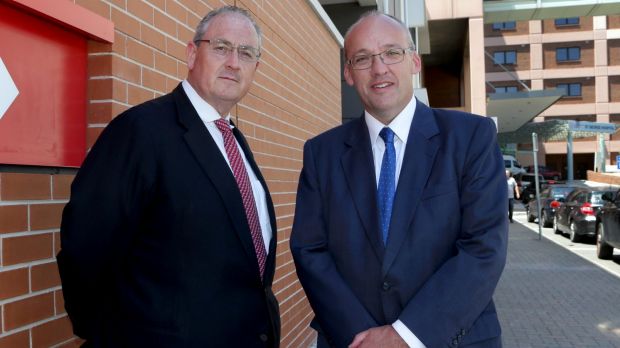
NSW Labor leader Luke Foley (right) with opposition health spokesman Walt Secord. Photo: Jane Dyson
Opposition leader Luke Foley will pledge $40 million to establish four walk-in medical centres staffed by nurses to relieve pressure on emergency departments.
In a move set to be opposed by the Australian Medical Association, Labor’s election promise will see 45 nurses staff the centres in western Sydney, Wollongong and the Central Coast.
A Medicare card will be required for admission, however patients won’t be charged, under the Labor policy to be announced on Sunday.
The treatment of flu, gastroenteritis, minor injuries, casts and issuance of “sick/carer certificates” will be the focus of the centres.
Opposition health spokesman Walt Secord said the model was successfully used in Britain and the ACT, and would complement the work of general practitioners.
The centres will be open seven days, until 10pm, to treat minor injuries and illnesses that would otherwise clog hospitals. However, they won’t treat infants aged under two, or motor vehicle or workplace injuries, and an ambulance would be called for emergency cases.
Mr Secord said there are 1.25 million hospital emergency presentations by people seeking treatment for the lowest triage categories, including sprained ankles, cuts and abrasions. He said at some hospitals, these cases make up a third of presentations.
“Western Sydney, Illawarra-Shoalhaven and the central coast have some of the most overstretched hospitals in the state. We will introduce the walk-in centres here first,” said Mr Secord.
“This is a very innovative approach to healthcare and a strategic investment. The walk-in centres will complement, not replace, other primary care services.”
Canberra Hospital opened the first walk-in centre run by nurses in 2010 and a second centre was opened by the ACT government last year. The two Canberra centres have treated 20,000 people since.
The AMA had opposed the Canberra walk-in centres and argued the money should have been spent on hospitals.
Changes were made to ACT law to allow nurses to dispense 30 medicines including antibiotics. Nurses there undertake two weeks of training before working in the centres.
Nurse practitioners in NSW already prescribe some drugs, including tetanus shots and local anaesthetic.
The Labor policy will see a summary of the patient’s visit sent to their GP.
“The Abbott and Baird governments have cut $18 billion from NSW hospitals. Without urgent action by a Foley Labor Government, the pressure on emergency departments will only intensify when the Abbott GP tax is introduced,” Mr Secord said.
